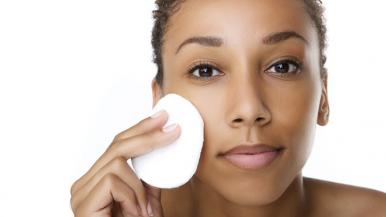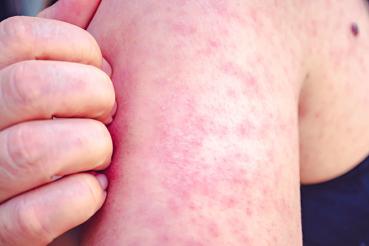Embarrassing blemishes can hit everyone — from eighth graders to engineers.
While acne is not a serious health threat, it is significant in an emotional and social sense. If you have acne, often you have less self-confidence, and this can affect your social life or even your productivity at work.
Learning how to stop breakouts before they happen is the key to keeping acne under control.
Why do I get acne?
Acne is an inflammatory skin problem caused by one or more of three things:
- Plugging of hair follicles
- Hormonal fluctuations that cause the body to secret excess oil
- Bacterial infection that causes inflammation
Acne severity can range from blackheads and whiteheads to cysts.
Nearly 85 percent of people between the ages of 12 and 24 experience acne. Why some people have severe breakouts while others barely have a pimple is not entirely clear. But genetics and environmental influences clearly play a role.
How to get clearer skin
All treatment for acne is aimed at preventing inflammation and reducing breakouts before they happen.
Claudia Hernandez, MD, a dermatologist at Rush University Medical Center, offers these 12 tips to help you achieve clearer skin — and banish blemishes when they do appear:
1. Keep your face clean.
Wash your face once or twice a day with an over-the-counter benzoyl peroxide face wash.
This reduces inflammation and kills bacteria associated with acne formation. And make sure to remove all makeup and dirt so it doesn't build up and clog your pores.
A very rare side effect of benzoyl peroxide is allergic contact dermatitis, so stop using the face wash if you develop a new rash.
2. Don't scrub with a washcloth ...
Use your hands to clean your face, and pat your skin dry with a clean towel instead of rubbing it dry. Scrubbing can actually promote more acne.
3. ... and avoid exfoliating brushes.
While commercials tout the benefits of these brushes, avoid them if you have acne. Studies suggest they can actually worsen acne. That's because the exfoliation causes more inflammation, resulting in more acne bumps.
All treatment for acne is aimed at preventing inflammation and reducing breakouts before they happen.
4. Eat a healthy diet.
While there is no scientific proof that chocolate and greasy foods aggravate acne, a study published in the Journal of American Academy of Dermatology suggests that consuming less sugars and carbohydrates results in decreased breakouts.
Keep a food diary to determine if a specific food triggers your breakouts. Eating an overall healthy diet is always good advice, and it may also help your skin stay clearer.
5. Don't ignore your hair.
If you have oily hair, you may need to wash it more often than people who have dry hair. Keeping your hair clean — and off of your face — will help prevent breakouts on the forehead and face.
Some hair products, including pomades and gels, may worsen acne. So if you have acne on your forehead and tend to use a lot of hair product, consider avoiding it.
Headbands that cover your forehead can encourage acne, too, by keeping sweat in place.
6. Shower and wash your face right after working out.
Sweat sticks to your face and may contain acne-causing bacteria.
For back and chest acne, try using your benzoyl peroxide wash in the shower.
Just remember — peroxide can bleach your linens, so stick with white towels and washcloths, and be sure you are totally dry before getting dressed.
7. Use moisturizers and sunscreens specifically made for the face.
Lotions designed for the body are heavier and can clog your pores.
Look for products with glycerine and hyaluronic acid, which hold moisture in the skin, and products labeled "non-comedogenic" — which means they don't cause acne.
No matter what, however, always wear sunscreen.
8. Use water-based, oil-free makeup.
Makeup has long been the go-to for covering up blemishes. But be careful — you might be making your breakouts worse. Heavy, greasy products with cocoa butter, mineral oil or cold cream can aggravate acne.
As with lotion and sunscreen, your makeup should be water-based, hypoallergenic, non-comdogneic and oil-free. Mineral-based products with silica, titanium dioxide and zinc oxide help absorb oil and minimize redness.
9. Take care removing facial hair.
Often it is best to use an electric razor, moving carefully downward to avoid nicking blemishes and pimples. Clean the blade regularly and shave in the direction of the hair growth.
Waxing and threading, while effective for hair removal, can contribute to a breakout with acne and/or irritation. Use these hair removal methods with caution.
10. Avoid touching your face.
Every time your fingers meet your face, they transfer dirt and oils. It's a hard habit to break, but an important one.
And wash your hands with soap and warm water frequently — especially after eating — to keep them clean.
11. Don't pick or pop your pimples. Ever!
It only increases your chances for inflammation and can lead to scarring.
12. Change your sheets at least weekly.
If there's dirt and oil on your sheets, it will rub off on your skin while you sleep.
This is especially important for your pillowcase because it's where you rest your face.
When to get help
Sometimes, despite your best efforts, you can't control acne on your own. If that's the case, don't hesitate to get help. A dermatologist's job is to shut down the inflammation.
These are the times that warrant seeing a doctor:
- If your child is younger than 8 and has acne, see a pediatric dermatologist. This might be a sign of early puberty and would require further evaluation.
- If your acne does not improve after 6 to 8 weeks of using over-the-counter products, visit your primary care doctor or a dermatologist.
- Moderate to severe acne requires treatment by a dermatologist or pediatric dermatologist, who will create a personalized acne treatment plan for you based on the type and severity of your acne.
- If you have scarring, there is help. A variety of treatments are available to get rid of acne scars, including laser treatments and chemical peels, but these are most effective once acne is well controlled.
Overall, be patient
Improvements take time. Often, you'll need to be treated for at least three months to start seeing improvements.
The good news is that there are lots of treatment options, so your dermatologist can keep trying if you're not getting results.




